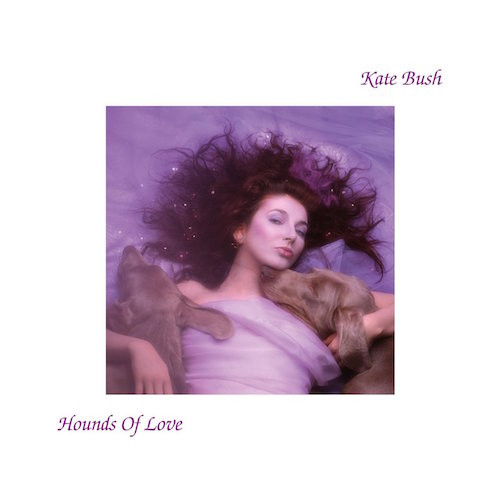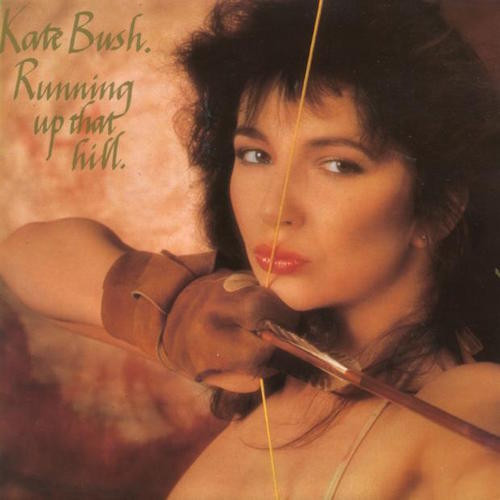“A Deal With God” song, more famously known as “Running Up That Hill” by Kate Bush, is more than just a track; it’s a cultural phenomenon that continues to resonate with audiences worldwide, and payoffsong.com explores the earning potentials and commercial triumphs of this masterpiece. This article delves into the elements that make this song a timeless hit and uncovers the licensing opportunities and financial success that can be achieved through iconic music. Learn about securing music royalties and leveraging a song’s popularity to unlock its commercial potential and discover hit song revenue.
1. What is the Story Behind Kate Bush’s “Running Up That Hill (A Deal With God)”?
The core message of “Running Up That Hill (A Deal With God)” delves into the complex depths of relationships and understanding. Kate Bush’s exploration of swapping roles to foster empathy resonates deeply. In 1985, Kate Bush released “Running Up That Hill (A Deal With God)” as a single from her album “Hounds of Love”. The song’s title was intentionally altered to “Running Up That Hill” to avoid controversy. In a 1992 interview, Bush explained that the song is about the inability of men and women to understand each other. The concept involves making a deal with God to exchange places with the opposite gender to gain mutual understanding. Despite initial reluctance from EMI, the single became a massive hit. It is celebrated for its unique sound and profound lyrical content. “Running Up That Hill” is a timeless exploration of empathy and connection.
- The song’s global reach highlights music’s unique ability to transcend cultural boundaries.
- Its success underscores the significant financial benefits of understanding music licensing and royalties.
- The enduring appeal of “Running Up That Hill” proves the lasting impact of music in media.
 Kate Bush Wuthering Heights
Kate Bush Wuthering Heights
2. What Were the Initial Reactions to “Running Up That Hill”?
“Running Up That Hill” quickly garnered acclaim in the UK, showcasing the immediate connection it made with listeners. Upon its release, “Running Up That Hill” made a significant impact on the UK charts. It debuted at number 9 and eventually peaked at number 3, marking it as Bush’s second-highest-charting hit in her home country during the 1980s. The song’s success extended globally, reaching the Top 10 in several countries, including Australia, Belgium, Germany, and Ireland. While it reached number 30 in the U.S., it remained on the Billboard Hot 100 for 20 weeks, demonstrating its staying power and broad appeal. Despite initial reservations from EMI, the song’s unique sound and profound lyrics resonated with a wide audience. Its commercial performance confirmed its status as a hit single.
- The song’s broad chart performance illustrates the varied revenue streams available through music licensing.
- Its initial success highlights the importance of strategic music promotion.
- The immediate positive reception underlines the potential for substantial earnings through hit songs.
3. How Did the Song “Running Up That Hill (A Deal With God)” Perform Commercially After Its Release?
“Running Up That Hill” achieved considerable commercial success after its release. It became a global hit. The song reached the Top 10 in multiple countries, including the UK, Australia, Belgium, and Germany. In the United States, “Running Up That Hill” peaked at number 30 on the Billboard Hot 100. The song remained on the charts for an impressive 20 weeks. This consistent performance underscored its broad appeal. Its success in both dance and rock charts further highlighted its versatility. These achievements demonstrate the song’s financial impact. Its enduring popularity has created substantial revenue over the years.
- This widespread commercial success shows the potential for substantial income through various music licensing avenues.
- The song’s performance illustrates the financial rewards of a well-executed music release.
- It demonstrates the importance of understanding hit song revenue.
 Hounds of Love Album Cover
Hounds of Love Album Cover
4. What Explains the Resurgence of Popularity for “Running Up That Hill (A Deal With God)” Decades Later?
The renewed fame of “Running Up That Hill” is mainly attributed to its use in the Netflix series Stranger Things. This placement introduced the song to a new generation. The song played a pivotal role in the show’s storyline, significantly enhancing its emotional impact. According to a report by Luminate, the song experienced a 9,900% increase in streams after being featured on Stranger Things. This resurgence propelled “Running Up That Hill” to new heights, including the top of the Billboard Global 200 chart. This renewed exposure demonstrates the powerful influence of sync licensing in films and TV. This has resulted in substantial revenue. Music supervisors recognize the value of using iconic songs.
- This resurgence shows the substantial benefits of strategic sync licensing.
- The song’s renewed popularity demonstrates the potential revenue from a well-placed song in popular media.
- This highlights the importance of understanding music royalties and licensing for long-term financial success.
5. How Did Kate Bush Retain Control Over Her Music and Publishing Rights?
Kate Bush has maintained considerable control over her music and publishing rights, allowing her to make strategic decisions that have boosted her financial success. Bush owns her master recordings through her company, Noble and Brite Ltd. This ownership allows her to control how her music is used and licensed. She also co-owns her publishing rights, giving her a say in licensing agreements for film, TV, and commercials. According to the Financial Times, Bush’s strategic control over her music has enabled her to maximize her earnings, particularly during the resurgence of “Running Up That Hill.” Her foresight in retaining these rights exemplifies the benefits of being a savvy music entrepreneur. She understands the significance of music licensing and royalties.
- Kate Bush’s control underscores the financial advantages of retaining music and publishing rights.
- Owning these rights allows for strategic decision-making, enhancing revenue potential.
- It showcases the importance of mastering music licensing to maximize financial returns.
6. What Specific Licensing Deals and Placements Have Significantly Contributed to the Song’s Earnings?
Several licensing deals have greatly boosted the earnings of “Running Up That Hill”. The most notable is its sync licensing in Stranger Things. This placement led to a massive increase in streams and sales. Additionally, the song has been featured in numerous commercials, TV shows, and films over the years. Each placement generates licensing fees, contributing to the song’s overall revenue. According to industry reports, sync licenses can range from a few thousand dollars to hundreds of thousands, depending on the usage and prominence of the song. Bush’s strategic control over her publishing rights has allowed her to negotiate favorable terms for these licenses. These deals have made “Running Up That Hill” a valuable asset.
- Strategic licensing deals provide substantial income opportunities in the music industry.
- Sync licensing in popular media can significantly increase a song’s earning potential.
- Successful placements underscore the importance of leveraging music royalties for financial success.
 Running Up That Hill Single Cover
Running Up That Hill Single Cover
7. What Are the Key Components of a Lucrative Music Licensing Strategy?
A lucrative music licensing strategy involves several key components. These components can significantly increase revenue for artists and rights holders.
- Ownership of Rights: Retaining both master and publishing rights allows for greater control over licensing opportunities and revenue.
- Strategic Placements: Targeting placements in popular media such as films, TV shows, and commercials can significantly boost exposure and earnings.
- Effective Negotiation: Securing favorable terms in licensing agreements ensures maximum financial benefit.
- Proactive Promotion: Actively promoting the music to potential licensees can create more opportunities for placements.
- Monitoring and Enforcement: Ensuring that licenses are properly enforced and royalties are correctly collected is crucial for maintaining revenue streams.
According to the National Music Publishers’ Association (NMPA), proactive management of music rights is essential for maximizing earnings in the digital age.
- A well-defined strategy is crucial for maximizing income from music royalties.
- Strategic placements in media significantly boost a song’s earning potential.
- Effective rights management and negotiation are essential for financial success.
8. How Can Emerging Artists Learn From the Success of “Running Up That Hill (A Deal With God)”?
Emerging artists can learn valuable lessons from the success of “Running Up That Hill”. They can apply these lessons to their own careers.
- Retain Rights: Whenever possible, retain ownership of both master and publishing rights to maintain control over their music and maximize earnings.
- Create High-Quality Music: Focus on producing music that resonates emotionally with listeners, increasing its potential for licensing and long-term success.
- Seek Strategic Placements: Actively pursue sync licensing opportunities in films, TV shows, and commercials to gain exposure and revenue.
- Build a Strong Network: Develop relationships with music supervisors, publishers, and other industry professionals who can help facilitate licensing deals.
- Promote Their Music: Proactively promote their music through various channels, including social media, streaming platforms, and live performances.
According to ASCAP, artists who actively manage their rights and pursue licensing opportunities are more likely to achieve financial success in the music industry.
- Emerging artists can increase their financial prospects by retaining rights.
- Focusing on quality and emotional resonance enhances the potential for licensing.
- Strategic networking and promotion are vital for securing lucrative placements.
 Placebo Running Up That Hill Cover
Placebo Running Up That Hill Cover
9. What Role Do Music Supervisors Play in the Success of Songs Like “Running Up That Hill (A Deal With God)”?
Music supervisors are crucial in the success of songs like “Running Up That Hill”. They select and license music for films, TV shows, commercials, and other media. Music supervisors often seek songs that enhance the emotional impact of a scene or resonate with the target audience. Their decisions can significantly boost a song’s exposure and popularity, leading to increased streams, sales, and licensing revenue. The resurgence of “Running Up That Hill” is largely attributed to its strategic placement by music supervisors in Stranger Things. Their expertise in matching music with visual media makes them essential in the music industry. Their selections drive both artistic recognition and financial success.
- Music supervisors are key to boosting exposure and revenue through strategic placements.
- Their expertise in matching music with visual media can drive artistic and financial success.
- The resurgence of “Running Up That Hill” demonstrates their pivotal role in the music industry.
10. How Does payoffsong.com Help Artists and Rights Holders Maximize Their Earnings From Music Licensing?
Payoffsong.com offers a comprehensive platform. It assists artists and rights holders in maximizing their earnings from music licensing. The site provides resources and tools to understand music rights, licensing processes, and royalty collection. Payoffsong.com helps artists connect with music supervisors, publishers, and other industry professionals. These connections can facilitate licensing deals. The platform offers guidance on negotiating favorable terms and ensuring proper enforcement of licenses. By leveraging payoffsong.com, artists and rights holders can navigate the complexities of music licensing. They can unlock new revenue streams.
Payoffsong.com also provides up-to-date information on industry trends and best practices.
- Payoffsong.com offers essential resources and tools for understanding music licensing.
- The platform helps artists connect with key industry professionals.
- It guides artists in negotiating favorable terms and maximizing revenue streams.
11. What Are the Common Pitfalls to Avoid When Negotiating Music Licensing Deals?
Several common pitfalls can undermine music licensing deals. It’s important to recognize and avoid these when negotiating.
- Underestimating the Value of the Music: Failing to accurately assess the worth of the music can lead to undervaluing licensing fees.
- Overlooking Scope of Use: Not clearly defining how the music will be used (e.g., territory, duration, media) can result in unforeseen limitations.
- Ignoring Royalty Splits: Neglecting to specify royalty splits between writers, publishers, and master recording owners can cause disputes.
- Failing to Secure Necessary Rights: Proceeding without obtaining all required rights (e.g., sync, mechanical, performance) can lead to legal issues.
- Lack of Legal Review: Not having a lawyer review the agreement can leave loopholes or unfavorable terms unaddressed.
According to legal experts, thorough due diligence and professional legal advice are crucial for avoiding these pitfalls and ensuring fair and beneficial licensing agreements.
- Avoiding these pitfalls ensures fair and beneficial licensing agreements.
- Accurately assessing the value of music and clearly defining usage scope are critical.
- Securing necessary rights and seeking legal review can prevent disputes and legal issues.
 Kate Bush 1985
Kate Bush 1985
12. How Can Technology Help Track and Manage Music Royalties Effectively?
Technology offers numerous solutions for effectively tracking and managing music royalties.
- Royalty Tracking Software: These platforms automate the tracking of royalties from various sources, ensuring accurate and timely collection.
- Digital Rights Management (DRM) Systems: DRM technologies protect music copyrights and monitor usage across digital platforms.
- Blockchain Technology: Blockchain provides a transparent and secure ledger for tracking music rights and royalty payments, reducing disputes.
- Data Analytics Tools: These tools analyze royalty data to identify trends, discrepancies, and potential revenue opportunities.
- Online Royalty Portals: Many collection societies and distributors offer online portals where artists can track their royalties and access detailed reports.
According to a report by the Music Business Association, technology-driven royalty management solutions can significantly improve transparency, efficiency, and accuracy in royalty distribution.
- Technology enhances transparency, efficiency, and accuracy in royalty distribution.
- Royalty tracking software and DRM systems automate and protect royalty collection.
- Blockchain technology provides a secure and transparent ledger for music rights management.
13. What Are the Different Types of Music Rights and How Do They Generate Revenue?
Understanding the different types of music rights is crucial for generating revenue in the music industry.
- Copyright: Protects original musical works, including songs and compositions, giving the owner exclusive rights.
- Publishing Rights: Control the composition of a song, including lyrics and melody, generating revenue through performance, mechanical, and sync royalties.
- Master Recording Rights: Cover the specific recorded version of a song, generating revenue through sales, streams, and licensing of the recording.
- Performance Rights: Generate royalties when a song is performed publicly, either live or through broadcast media.
- Mechanical Rights: Generate royalties when a song is reproduced, such as through physical copies, downloads, or interactive streaming.
- Sync Rights: Generate royalties when a song is synchronized with visual media, such as films, TV shows, and commercials.
According to the U.S. Copyright Office, understanding and managing these rights are essential for musicians and rights holders to protect their work and generate income.
- Understanding these rights is essential for protecting musical works and generating income.
- Publishing rights cover song composition, while master recording rights cover specific recordings.
- Performance, mechanical, and sync rights generate royalties through various uses of the music.
14. What Legal Recourse Do Artists Have if Their Music is Used Without Permission?
Artists have several legal options if their music is used without permission.
- Copyright Infringement Lawsuit: Artists can sue for copyright infringement, seeking damages and an injunction to stop the unauthorized use.
- Cease and Desist Letter: Sending a formal letter demanding the infringing party to stop using the music and take corrective action.
- Digital Millennium Copyright Act (DMCA) Takedown Notice: Filing a notice with online platforms to remove infringing content.
- Negotiated Settlement: Attempting to reach a settlement with the infringing party, which may involve licensing fees and other compensation.
- Criminal Charges: In some cases, unauthorized use of copyrighted music can result in criminal charges, particularly for large-scale or commercial infringement.
According to the American Intellectual Property Law Association (AIPLA), artists should act promptly and seek legal counsel to protect their rights and pursue appropriate remedies.
- Artists can pursue copyright infringement lawsuits and send cease and desist letters.
- DMCA takedown notices can remove infringing content from online platforms.
- Negotiated settlements and, in some cases, criminal charges are also options for legal recourse.
15. How Is the Music Industry Adapting to Changes in Copyright Law and Digital Media?
The music industry is constantly adapting to changes in copyright law and digital media.
- Legislative Advocacy: Music industry organizations actively lobby for updated copyright laws that protect artists’ rights in the digital age.
- Technological Innovation: Companies are developing new technologies for tracking and managing music rights online, such as blockchain and AI.
- Licensing Models: The industry is exploring new licensing models that accommodate the changing ways people consume music, such as micro-licensing and subscription services.
- Education and Outreach: Organizations are educating artists and consumers about copyright law and the importance of respecting music rights.
- Collaboration: The industry is fostering collaboration between artists, labels, publishers, and technology companies to address challenges and opportunities in the digital landscape.
According to the Recording Industry Association of America (RIAA), adapting to these changes is crucial for ensuring a sustainable and vibrant music ecosystem.
- The music industry is adapting through legislative advocacy and technological innovation.
- New licensing models accommodate changing music consumption habits.
- Education, outreach, and collaboration are key to addressing challenges in the digital landscape.
Navigating the world of music licensing can be complex, but payoffsong.com provides the resources and expertise you need to succeed. Don’t miss out on opportunities to maximize your earnings and protect your rights. Visit payoffsong.com today to discover how we can help you make the most of your music. Address: 1601 Vine St, Los Angeles, CA 90028, United States. Phone: +1 (323) 469-2211.
FAQ Section
1. What is sync licensing, and how does it benefit musicians?
Sync licensing is when music is licensed for use in visual media like films, TV shows, or commercials. It benefits musicians by providing exposure and generating income through licensing fees.
2. What are master and publishing rights, and why are they important?
Master rights cover the recorded version of a song, while publishing rights cover the composition. Owning both gives artists more control and revenue opportunities.
3. How can emerging artists attract the attention of music supervisors?
Emerging artists can attend industry events, network with music supervisors, and submit their music to online platforms that connect artists with licensing opportunities.
4. What is the role of a music publisher?
A music publisher helps songwriters manage their copyrights, negotiate licensing deals, and collect royalties on their behalf.
5. What are performance royalties, and how are they collected?
Performance royalties are generated when a song is played publicly. They are collected by performance rights organizations (PROs) like ASCAP and BMI and distributed to songwriters and publishers.
6. How does blockchain technology impact music rights management?
Blockchain provides a transparent and secure way to track music rights and royalty payments, reducing disputes and ensuring fair compensation for artists.
7. What are the key elements of a successful music licensing agreement?
Key elements include clearly defining the scope of use, specifying royalty splits, securing necessary rights, and having a legal review.
8. How can artists protect their music from unauthorized use online?
Artists can use digital rights management (DRM) systems, monitor online platforms for infringement, and file DMCA takedown notices when necessary.
9. What are the current trends in music licensing for video games?
Trends include increased demand for indie music, personalized soundtracks, and integration of music into gameplay mechanics.
10. What resources does payoffsong.com offer for artists interested in music licensing?
payoffsong.com provides resources on music rights, licensing processes, royalty collection, and networking opportunities with industry professionals.
